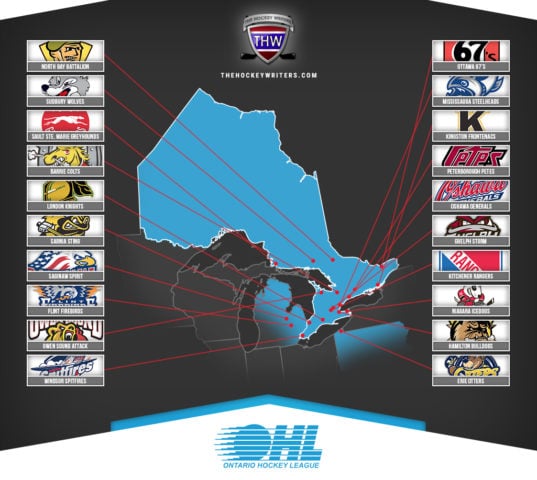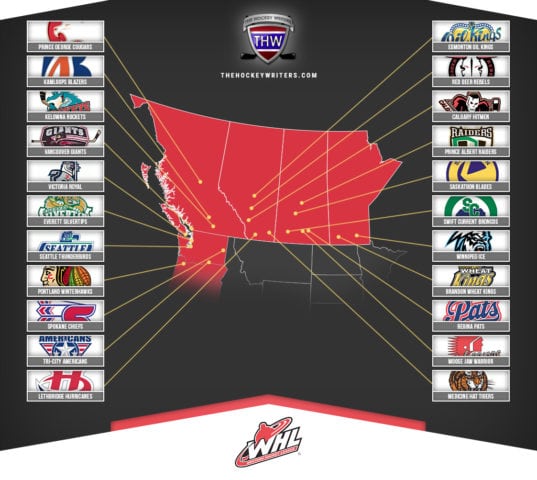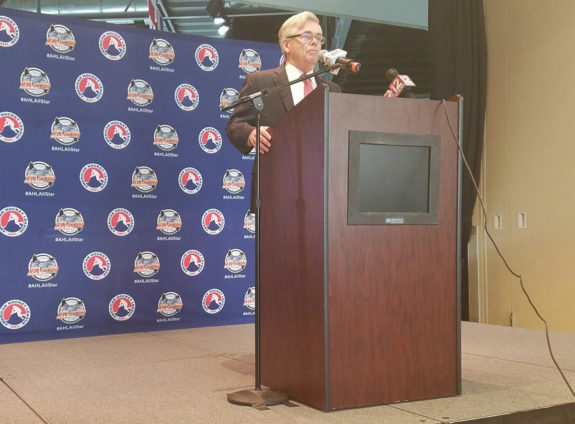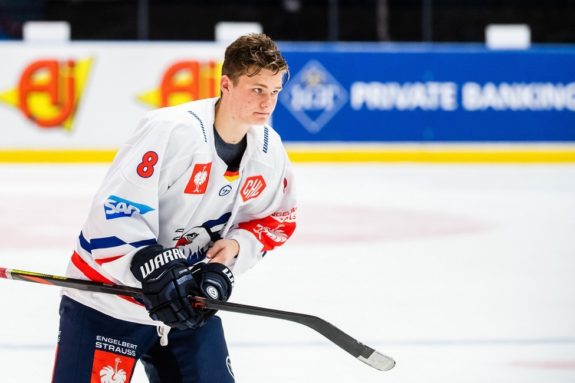On July 17, I learned via the Merrit Centennials twitter account that the BCHL was eying a Dec. 1 start date. That got me thinking about the junior leagues that compose the CHL.
#BCHL #NEWS:
— Merritt Centennials (@BCHLCentennials) July 17, 2020
The BCHL has announced that they are planning to open the regular season on December 1st.
Read more: https://t.co/NgFqD6uSkD #BCHL pic.twitter.com/gY1Oi44h2G
Would the OHL and WHL with their United States-based teams be able to hit a similar target date? How might this affect the draft? What about the AHL? Are there any solid dates in the works for if and when the AHL can restart? What are NHL teams going to do with their prospects? There’s a lot of questions here and they do not have simple answers.
The CHL’s United States Question
The CHL is composed of three leagues: the Western Hockey League (WHL), Ontario Hockey League (OHL) and Quebec Major Junior Hockey League (QMJHL). The QMJHL no longer has any US-based teams. The OHL has three US-based teams and the WHL has five US-based teams.
| TEAM | LEAGUE |
| Erie Otters | OHL |
| Flint Firebirds | OHL |
| Saginaw Spirit | OHL |
| Everett Silvertips | WHL |
| Portland Winterhawks | WHL |
| Seattle Thunderbirds | WHL |
| Spokane Chiefs | WHL |
| Tri-City Americans | WHL |
There is currently a restriction on “non-essential” cross-border transit between the US and Canada. Those restrictions were set to end on July 22 but have been extended until Aug. 21. Assuming no type of additional border closing goes into effect beyond that date on the part of the US or Canada, the travel complication will go away.

The border crossing status is not the only obstacle to the OHL and WHL returning to play. Junior hockey teams are not the NHL and do not have access to the kind of financial resources that the NHL is currently looking to expend to house twenty-four teams in hotels in two hub cities. That kind of financial expenditure would be all but impossible for junior hockey franchises. Players live with billet families during the weeks they are home and not traveling with the team. Those billet families would, in theory, have to be subject to strict quarantine and contact tracing standards if the viral outbreak does not subside in the US prior to Dec. 1.

The QMJHL could possibly make a Dec. 1 start date like the BCHL partially because it lacks US franchises. Most of the teams are located within the province of Quebec, but there are four teams that are located in the reasonably isolated provinces of Nova Scotia and Prince Edward Island. However, because of the importance and prestige of the Memorial Cup, it seems unlikely that the QMJHL would start separately from the other two members of the CHL.
Where Does the AHL Stand?
Regarding the AHL, there was a column on ESPN from Greg Wyshynski on May 13. He reported, “The AHL is currently building schedules for the 2020-21 season that optimistically forecast an October start but that also plan for start dates in November, December and January. The message is clear: The AHL is willing to wait for as long as it can to start playing until the fans can return to games.”
Since May, COVID-19 cases in the US have continued to trend upward. As more time passes without a substantial drop in cases, those October and November start projections seem more and more like fantasy. Even the NHL does not predict being able to start its next season until possibly December. Certainly, the AHL has taken this under advisement?

The most recent update I was able to find was an interview Corey Pronman of The Athletic did with then AHL president David Andrews on June 26. In it, Andrews repeats, almost verbatim, what was said in the Wyshynski piece:
We are in a very uncertain time and the return to play plan for our league could take many different shapes. We have been contingency planning for some time. We’re building schedules for a regular season that starts in October, but we’re also building models to start in November, December or January before we have the go-ahead from public health authorities.
From ‘Burning questions for next season with heads of the AHL, NCHC and USHL,’ The Athletic, 06/26/2020
So, as of June 26, the AHL was still in a holding pattern. A possible reason for this could have had something to do with Andrews’ (at the time) impending turnover of the position of league president to Scott Howson on July 1. In an interview with The Telegraph back in May, Howson’s comments echoed the sentiments expressed in the May Wyshynski piece and the June Pronman piece.
What if we can’t start until November and what if we can’t start until December or January? What if we can’t start with everybody in the building or less than half the people in the building? What does it do for our teams? How do we do it to keep our teams’ sustainable? We’ve got to be flexible and we’ve got to be nimble. We’ll have a plan that’s ready. We just don’t know what the plan is going to be or which one we’re going to take.
From ‘AHL’s new president “flexible” on when to start next season,’ The Telegraph, 05/13/2020
As of right now, there is no evidence or reports that the AHL has changed it’s stance in spite of the rising number of confirmed virus cases in the US. Things might actually remain that way until the NHL teams (owners of 19 of the 31 AHL franchises) figure out exactly what their 2020-21 season is going to look like. The new Collective Bargaining Agreement, signed on July 10, has given some idea of time tables, but until the playoffs actually finish, those dates are not set in stone.
Related: Top 10 Best Ice Hockey Leagues
To be fair, it’s not like the league itself can be held accountable for the uncertainty surrounding it. The tactic of having multiple plans for multiple potential start dates is certainly more responsible than attempting to force the league into a time table that could be considered reckless. Unfortunately, the cost of being responsible is a lot of uncertainty for players.
Who’s Loaning Whom to Where
The KHL season, as of right now, is projected to begin in September. Development camps are currently underway. During the past few weeks, top AHL scorer Reid Boucher and NHL depth forward Jakub Lilja have signed with KHL clubs. Over the last couple weeks, several NHL prospects have also been loaned to KHL teams.
| PLAYER | NHL FRANCHISE | TEAM LOANED TO |
| Maxim Sushko | Philadelphia Flyers | Dinamo Minsk |
| Yegor Sharangovich | New Jersey Devils | Dinamo Minsk |
| Dmitri Samorukov | Edmonton Oilers | CSKA Moskova |
| Alexander Khovanov | Minnesota Wild | Ak Bars Kazan |
| Vladislav Kolyachonok | Florida Panthers | Dinamo Minsk |
| Ivan Lodina | Minnesota Wild | Dinamo Minsk |
Also making the move to Dinamo Minsk from the WHL’s Prince Albert Raiders is 2020 draft-eligible prospect Ilya Usov. Two other prospects with their NHL rights owned but without NHL contracts (Nikita Popugayev and Mikhail Shalagin) have moved from the ECHL to the KHL.
As of right now, this appears to be an isolated thing and only happening with the KHL and a select few NHL prospects. Belorussian KHL club, Dinamo Minsk seems to be the primary beneficiary of this. Four of the players loaned, so far, have been to that team. This is likely because Belarus is a nation that reportedly handled their COVID-19 situation very effectively. However, it would not surprise me if we started to see loans from not only NHL teams, but also CHL teams to leagues based in Finland, Switzerland, Slovakia, Germany and the Czech Republic. All these countries are reported to have a good handle on their COVID-19 situations.

I spoke to THW’s lead draft writer Larry Fisher and asked his opinion.
“I expect most Europeans will start the season at home with out-clauses to attend NHL training camps as well as to play in the CHL as imports if and when the WHL, OHL and QMJHL seasons get underway. They are projected to start in October but may be delayed until the New Year, so I assume most of the CHL imports will play at home in the meantime with the ability to leave when called upon. They will have that option and that is still a win-win situation for all parties involved.”
Larry Fisher – 07/19/2020
RELATED: 2020 NHL Draft: Fisher’s Top 500 Final Rankings
The certainty of a start date and being able to stay in Europe has to appeal to some players. Reports of the current status of the US battle against COVID-19 have to be reaching these players via international news, North American teammates and their agents. Regardless of spin, the news cannot be encouraging. Drafted prospects like 2019 eighth-overall pick Philip Broberg have to be considering whether or not it’s best for them to remain overseas for the 2020-21 season.
For some, being able to focus on hockey and get back on the ice as soon as September might seem like a life raft of normalcy in uncertain seas. Their NHL franchises and agents have to weigh those decisions also. While most will likely have some kind of NHL-out clause in their contracts, decisions must be made on a player-by-player basis of what is best for their individual development.

Playing in Europe could certainly be appealing for those players who feel like they might be unlikely to see NHL action anyway in the 2020-21 campaign. In theory, NHL teams could value engineer their prospect pools into tiers, and separate those tiers based upon the likelihood of a player making an NHL impact this season. It might make sense for teams to try to find temporary homes for European players outside of their top tier.
Based on the six loans I mentioned, it would seem that some NHL general managers have already seen this writing on the wall. With the uncertainty swirling around the North American leagues, it might be worth it to send certain prospects into situations with some certainty even though they may have played last season in North America.
What About the Draft?
It’s also worth taking into account the implications that the European leagues starting close to on-time might have on the NHL draft. If the draft occurs in October, it seems likely that top prospects Tim Stutzle (DEL), Lucas Raymond (SHL) and Alex Holtz (SHL) will play their 2020-21 season in Europe. Lottery teams might not get to see their top pick players in their uniform on North American ice until September of 2021. Again, it’s possible that these players will have NHL-out clauses in their contracts that would allow them to attend NHL training camps. But, we’re talking about players leaving their European teams possibly three months into a season for several weeks to participate in NHL training camps.

What if the situation is such that those players have to quarantine to re-enter their European country? It just feels like NHL teams picking European players early in the first round should do so expecting not to see those players in North America until 2021. I’m not sure to what degree that scenario could affect the draft order, but if a certain team passes on a highly ranked European player in favor of a slightly lower-ranked North American player, that question should be revisited.
RELATED: 2020 NHL Draft Guide
Opinions on the virus aside, the world of hockey has been thrown into chaos because of COVID-19. European leagues like the KHL, Liiga, DEL and NLA are targeting autumn start dates. Current projections have North American leagues starting in December at the earliest. Five NHL teams have already loaned players and it seems like only a matter of time before other NHL and CHL teams get on board. Individual players may also be forced to make difficult decisions about where they will spend the upcoming season. In these uncertain times, any kind of certainty is a good thing.